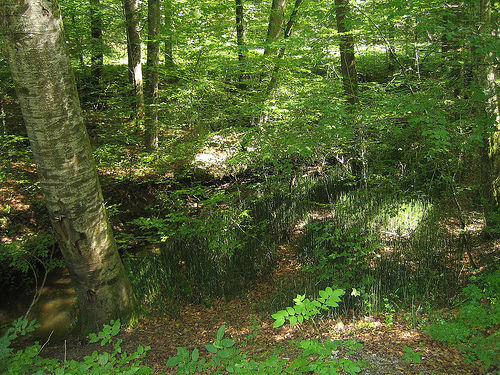This is post #39 in our series on Tafseer of Juz ‘Amma (click the link to see all posts in this series).
The tafseer of Surah Naba’ really speaks for itself; it talks about the Day of Judgment, Paradise, and Hellfire–three strong, recurring themes in the last juz. And this is, of course, the first surah in Juz ‘Amma.
Therefore, we’re going to focus mostly on the linguistic meaning of the words in the verses, and some gleams of tafseer you might not extract from just reading the verses in Arabic.
Allah (‘azza wa jal) says:
عَمَّ يَتَسَاءَلُونَ
Translation: About what are they asking one another? [Surah An-Naba’, verse 1]
The first word, ‘amma, is actually a compound of two words; ‘an (عن), which is an interrogative particle (indicates a question) and roughly means “about,” and maa (ما), which means, “what.” They are combined into ‘amma–about what? This is what gives the juz it’s name.
Yatasaa’aloon comes from sa’ala/yas’alu, which means to ask. There’s an additional fourth letter here, the ta (ت), which changes the meaning from the expected “what are they asking” (‘amma yasaluwna) to “what are they asking each other.”
Verse two continues:
عَنِ النَّبَإِ الْعَظِيمِ
Translation: About the great news – [Surah Naba, verse 2]
An-Naba (النَّبَإِ) means news; this is the word that gave the surah it’s name. Atheem means great, just like the name of Allah, Al-Atheem; here, it’s an adjective to naba’.
Allah (‘azza wa jal) continues:
الَّذِي هُمْ فِيهِ مُخْتَلِفُونَ
Translation: That over which they are in disagreement. [Verse 3]
This verse hints at a reality–that people disagree about the Day of Judgment. Muslims believe in it, but non-Muslims don’t; and we argue over it. Then Allah says:
كَلَّا سَيَعْلَمُونَ
ثُمَّ كَلَّا سَيَعْلَمُونَ
Translation: No! They are going to know.Then, no! They are going to know. [Verses 4-5]
Kalla is an emphatic, strong no; in the Qur’an, it negates something before it (which may be deleted); in this case, it’s negating their denial of the Day of Judgment; it WILL come to pass.
This looks similar to Surah At-Takaathur, where we saw two “sa-ya’lamuwn” (or in that case, sawfa ta’lamoon); the first indicated the realization when the person dies, and the second, when they are resurrected.
The difference between ya’lawmuwn and ta’lamuwn is that the former is third-person (they), while the latter is second-person (you). And as for the addition of sa (س) or sawfa (سوف), it makes it certainly future-tense (the mudaari’ verb indicates present or future tense).
Then Allah (subhannahu wa ta’ala) continues:
أَلَمْ نَجْعَلِ الْأَرْضَ مِهَادًا
Translation: Have We not made the earth a resting place? [Verse 6]
The first part of this verse is interesting; it has an alif, which is an interrogative particle (i.e. a question-mark), followed by a negation (lam). It’s almost calling the person to contemplate and say, yes, you did.
Then Allah says:
وَالْجِبَالَ أَوْتَادًا
وَخَلَقْنَاكُمْ أَزْوَاجًا
وَجَعَلْنَا نَوْمَكُمْ سُبَاتًا
وَجَعَلْنَا اللَّيْلَ لِبَاسًا
وَجَعَلْنَا النَّهَارَ مَعَاشًا
وَبَنَيْنَا فَوْقَكُمْ سَبْعًا شِدَادًا
Translation: And the mountains as stakes? And We created you in pairs. And made your sleep [a means for] rest. And made the night as clothing. And made the day for livelihood. And constructed above you seven strong [heavens] [verses 7-12]
Here, we see an enumeration of the many blessings of Allah upon us. Among them are:
- Mountains that keep the earth pegged in place (tectonic plates), so that continents don’t slide around too much
- Sleep refreshes and rejuvenates you; get rest out of it.
- Night time. Can you imagine sleeping in daylight all the time?
A couple of Arabic words to bring to your attention–jibaal is the plural of jabal (جبل), which means mountain. And ma’aash (معاش) means something that everybody has to go out and do; earn a livelihood. Work for a living.
Also, the seven heavens which are implicitly mentioned — all of the scholars are in consensus that the first heaven includes everything in the known universe. What’s beyond it, we don’t know; but we know there are seven samawaat.
Then, Allah (‘azza wa jal) says:
وَجَعَلْنَا سِرَاجًا وَهَّاجًا
Translation: And made [therein] a burning lamp. [Verse 13]
This is where the famous da’ee, Siraaj Wahhaj, picked his name out of. This “burning lamp” refers to none other than the sun; how do we know? Because siraaj means “has light,” and wahhaaj means “gives light.” The moon gives light, but it doesn’t have light–it’s just reflected light from the sun.
Then, Allah says:
وَأَنزَلْنَا مِنَ الْمُعْصِرَاتِ مَاءً ثَجَّاجًا
لِّنُخْرِجَ بِهِ حَبًّا وَنَبَاتًا
وَجَنَّاتٍ أَلْفَافًا
Translation: And sent down, from the rain clouds, pouring water, That We may bring forth thereby grain and vegetation. And gardens of entwined growth. [Verses 14-16]
In verse 14, anzalnaa (أَنزَلْنَا) is the “we form of anzala (أَنزَلَ), which is originally from nazala (نزل). Nazala means to descend; anzala means to cause something to descend. And anzalnaa? “We caused to descend.”
And a point of advanced grammar: in verse 15, Allah says, “li-nukhrija,” (لِّنُخْرِجَ) and not li-nukhriju. Why is nukhriju mansoob, showing fatha instead of damma? The answer is, because it’s lam-ut-ta’leel, the lam of explaining, which turns a mudaari verb into the mansoob case.
And finally–what’s the point of all these verses? Why send down verse after verse after verse, explaining and pointing out the different blessings of Allah?
So that we can think, and contemplate, and understand. These are verses that really illustrate a fragment of Allah’s power. That’s Allah–the one who created the mountains. And the clouds. And rain. And green growth. For us.
Think about it.
Wallahu a’lam.

References:
- Touched by an Angel: Tafseer of Juz ‘Amma. By Muhammad Alshareef. 2009.
- Tafsir ibn Katheer, summarized version, online.